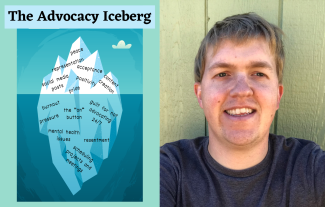My Stammering Advocacy Iceberg

James Hayden, our regular contributor from the U.S., tells us how he's learnt to be open about every aspect of the stammering experience.
If you've been in the stuttering world long enough, then you've probably heard the popular analogy likening stammering, or stuttering, to an iceberg. For those unfamiliar with it, allow me to explain. Only 10% of an iceberg is visible while the remaining 90% is underneath the surface. Likewise, only 10% of stuttering is visible. During a stuttering moment, the audience sees the head jerks, blocks, lack of eye contact and the other minute secondary characteristics associated with it. What the audience doesn't see is the 90% that typically lives rent free in a person who stutter's head: guilt, shame, embarrassment, doubt, fear, and wondering if their voice is worth hearing, among many others.
Recently, I was talking to my friend Nicole about a presentation I was preparing to give. The topic was about recently taking a break from publicly advocating for stuttering and what I learned from it (read my previous article for more on this). As we were talking, I realised that advocacy is like an iceberg too. Once that comparison left my mouth, I stopped in my tracks. I never thought about it until that moment, but it's so true.
Whenever I talked about it, I felt that I had to give my audience the rainbows and unicorns version of stuttering. God forbid people hear the unfiltered version.
Before my hiatus, I thought advocacy had to be big things. Articles about stuttering galore. A TEDx talk. Guest lectures at numerous universities. Presenting at conferences and networking events. Podcast appearances. Social media posts sharing only the great things about stuttering. Whenever I talked about it, I felt that I had to give my audience the rainbows and unicorns version of stuttering. God forbid people hear the unfiltered version about stuttering and how it can suck at times. Like an iceberg, my social media followers and most people in my life saw the 10% of my advocacy work. The good stuff, as I call it.
For the longest time, I was afraid to talk about the 90% both in my public and personal life. This was for many reasons. Whenever I talked about stuttering in a public setting, I talked about the positives and intentionally didn't mention the negatives. Over time, I amped up the positives and diminished the negatives to the point where I thought I could only talk about the positives because that's what I was known for. I feared that if I talked about the negatives, then I wouldn't get any more speaking gigs at universities. There was a time when I wanted to do public speaking full time and thought it couldn't happen if I was too honest about stuttering. But if I'm being honest, I think the reasons were more personal than I cared to admit to myself and others.
You see, as confident as my public persona was about being a person who stutters, my actual self was still apprehensive.
You see, as confident as my public persona was about being a person who stutters, my actual self was still apprehensive. I could give a TEDx talk to 300+ people but ordering food from a drive-thru was an ordeal. I could talk about stuttering to a large group of people, but I couldn't say I stutter in one-to-one conversations. I was embarrassed to watch myself back on video because I was uncomfortable with my stuttering moments, although I didn't tell many people. Because my public persona was more confident, I relied on that when I was at networking events. In a way, it was a defence mechanism against my insecurities.
Over the last year and a half or so, I started to become more comfortable talking about the 90% in my public and personal life. I realised that to be my best self I had to be honest with everyone. This belief was further cemented in June 2022 when I lived in the woods for a week with only limited supplies and a change of clothes (if you know, you know). I won't go into the details behind that experience, but living with next to nothing showed me the true me. I learned that it was best to be genuine and authentic in all aspects of life and show the good, bad and ugly of every situation.
Every time I talk about my 90% it helps me grow in my journey of being OK with, accepting, and ultimately embracing this part of myself.
Talking about the 90% has been met with only positive reactions. People are glad that I shared those thoughts and experiences with them. As a result, the relationships with everyone in my life, including with myself, have only strengthened. In my biased opinion, I think my articles over the past year are some of my best. This is because I'm writing as 100% James and not 10% James.
So, back to the iceberg. I think it's important to talk about both the 10% that everyone sees as well as the 90% that we might be ashamed of or embarrassed by. I know personally, every time I talk about my 90% it helps me grow in my journey of being OK with, accepting, and ultimately embracing this part of myself. The way I see it, growth is a lifelong journey and only ends when I'm six feet under. Likewise, if we're not honest about the lived experience then we are doing a disservice to future generations of speech & language therapists and more importantly people who stutter.
Stuttering isn't always, if at all, rainbows and unicorns. It's fear, doubt, shame, and a slew of other emotions. If sharing the 90% helps even one person on their journey, then I'll share my 90% every day.
Read more articles from James. Would you like to write an article? Tell us about your stammering-related experiences or opinions. Email editor@stamma.org or see Submit Something For The Site.
(The Advocacy Iceberg image courtesy of Nicole Kulmaczewski)

































